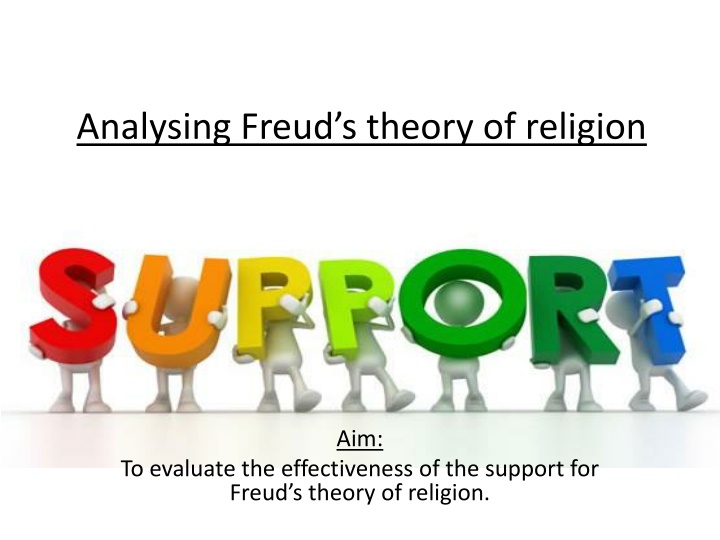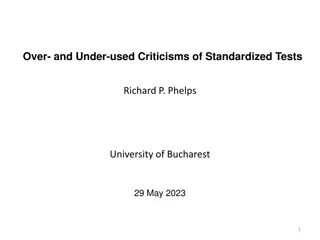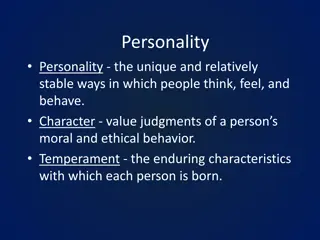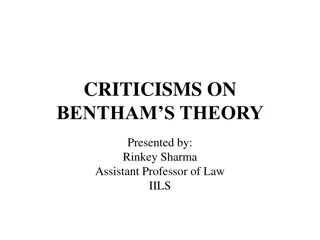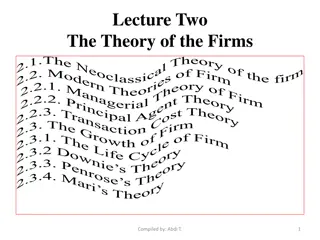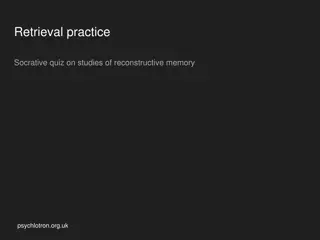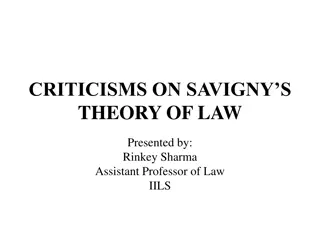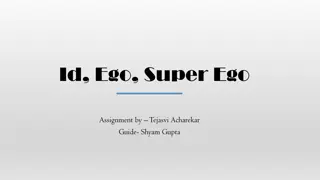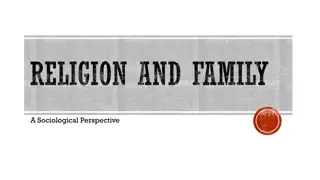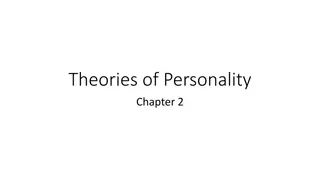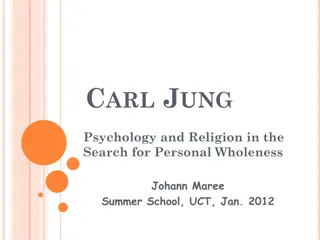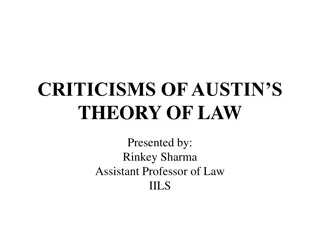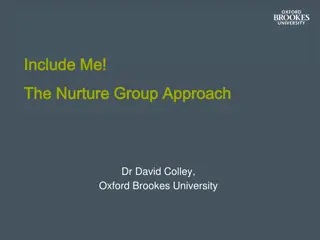Critique of Freud's Theory of Religion: Examining Evidence and Key Criticisms
The analysis delves into Sigmund Freud's theory of religion, evaluating its support and challenges. The presentation highlights key criticisms regarding historical, anthropological, and psychological evidence, as well as Freud's conclusions on religion. Critiques focus on the lack of evidence for concepts like the Oedipus Complex and Primal Horde, showcasing discrepancies in Freud's theories. The content discusses how Freud's male-centric perspectives and assumptions raise doubts about the validity of his claims, especially in the context of diverse societies. Despite Freud's influential contributions, his theories face significant scrutiny due to insufficient empirical backing and underlying biases.
Uploaded on Sep 17, 2024 | 0 Views
Download Presentation

Please find below an Image/Link to download the presentation.
The content on the website is provided AS IS for your information and personal use only. It may not be sold, licensed, or shared on other websites without obtaining consent from the author.If you encounter any issues during the download, it is possible that the publisher has removed the file from their server.
You are allowed to download the files provided on this website for personal or commercial use, subject to the condition that they are used lawfully. All files are the property of their respective owners.
The content on the website is provided AS IS for your information and personal use only. It may not be sold, licensed, or shared on other websites without obtaining consent from the author.
E N D
Presentation Transcript
Analysing Freuds theory of religion Aim: To evaluate the effectiveness of the support for Freud s theory of religion.
Correct spellings 1. Psychology 2. Fulfilment 3. Neurosis 4. Unconscious 5. Psyche 6. Libido 7. Repression 8. Oedipus 9. Ambivalence 10.Traumatic
Ways I could use these slides Organise the info into a chart Make support and attack cards and colour code them Read through the slides and write a rant on Freud or do a video Read through slides and come up with 6 of the most important criticisms in your opinion justify your views
Challenges to Freud Almost all the evidence that Freud presents has been discredited in one way or another (Palmer in Freud and Jung on Religion)
Key Criticisms Historical and anthropological evidence regarding primal horde The psychological evidence regarding the Oedipus Complex Freud s dependence on a narrow selection of evidence Freud s conclusion that religion should be overthrown
Criticisms of Freud Lack of evidence for oedipus Complex and Primal Horde Theory Some research has supported the idea of repression, but Primal Horde has been totally rejected. Freud s theory depends on the idea that characteristics are inherited from one generation to the next. There is no evidence for primal patricide (killing of fathers), or for genetic inheritance of guilt and fear. It is particularly difficult to claim that a repressed Oedipus Complex is behind religion which is focused on a female deity, or in a matrilineal society (were women have authority). Freud is criticised for his male- orientated view of society and religion. He described women as suffering from penis envy, because they were effectively men without a penis! Part of the Oedipus Complex suffered by men involved fear that they would be castrated in retribution for their sin (i.e. The original killing the father of the Primal Horde). Freud thought that young boys would see women simply as castrated men, thus confirming the boys fears!
Anthropological Evidence for Primal Horde The whole theory of the horde was based on Darwin s mere speculations. It is now not accepted that people were groups exclusively in hordes. Instead, it is likely that there was much greater variety. Not all societies had totem objects, whom they worshipped, and there is no evidence for the guilty totem meal; the British anthropologist E E Evans-Pritchard (1902-73) doubts that this ever happened. The idea that guilt is handed down from generation to generation has likewise been discredited. This criticism damages Freud s claim that religion is guilt-based because it removes the major source of guilt. The primal crime never happened and could not transmit guilt even it if did. It also weakens the Oedipus Complex theory, since the primal crime was an important illustration of its effects on society.
Psychological Evidence for Oedipus Complex The major critic for Freud s theory of the Oedipus Complex is Bronislaw Malinowski, in his book Sex and Repression. Freud needed the complex to be universal for it to be the cause of all religion, and needed it to be caused by our natures for it to precede religion and be the cause of it. Malinowski attacked both these points. First, he pointed to the Trobriand race, where the role of the father is more that of a weak nurse. In this race there is no evidence of the Complex. Their religion, therefore, must have originated elsewhere. Second, looking at the animal world, he found nothing inherent in the nature of animals that could cause such a complex. The role of both father and mother is one of support. Malinowski argued instead that the Complex is caused by the strict rules of religion rather than being the cause of them. This attack on the Oedipus Complex leads to the conclusion that sexual guilt is not in fact the cause of religion. As a result, Freud s attack on religion does not contain the force it was once believed to have.
A Narrow Selection of Evidence Freud s theories relied on the importance of the father figure, which is developed by the mind into the male God of Judaism or Christianity. They therefore failed to take into account of religions based upon female deities, such as the Egyptian Isis cult, or religions which do not have any single dominant object of worship, such as Buddhism. They also failed to take into account societies like the Trobriand race, where the father plays an insignificant role in the development of the child. In societies such as these, religion could not be attributed to the tensions with the father, since no such tensions occurred. Freud can therefore be criticised for constructing a theory to explain the societies and religions with which he was familiar, and ignoring those of others. In a similar way, we can criticise the way he generalised the results of his five cases, assuming that the Oedipus Complex that he detected at work in those instances was in fact at work everywhere. Biased because atheist. Cited most of his criticisms on conservative expressions of religious belief
Criticisms of Freud Circular and reductionistic Some people object to Freud s theory because his starting point is biased atheism. He is accused of a circular argument, which is biased from the very beginning and seeks to prove its own hypothesis without being objective. His theory is also reductionistic: it attempts to explain religion away (i.e. To explain why people indulge in this mistaken behaviour) in terms of a discipline which is completely outside of religion (psychology). A non-reductionistic theory, which tried to look at religion in its own terms, would be preferable. Freud s promotion of atheism is in itself a rejection of the father figure (God), in which case his criticism is contradictory and self- defeating!
An unjustifiably negative view of religion The British psychoanalyst Donald Winnicott (1896-1971), for example, has argued that religion is an essential buffer between the mind and external reality. Religion is useful in that it helps humans develop adapt to their environment by providing a source of comfort and familiarity. The role and value of religion are similar therefore to those of art and music. Ana-Maria Rizzuto argued that religion is no more of an illusion than science. Both disciplines require us to interpret data and impose order on the world. Freud s assumption that science has the sole claim to the truth is unacceptable. Rizzuto has therefore argued that Freud has not so much removed the illusion of religion but, rather, replaced religion with an illusion. Ignored benefits of religion (stimulating social altruism, maintaining morality, developing human potential, sense of contentment)
Criticisms of Freud Religion as illusion Freud may be right and religion may well be illusion there is no accepted universal truth. However, Freud is criticised for his simple assumption that illusion is bad and should be abandoned. Many would argue that illusion , say in the form of art, imagination and creativity are all positive. Religion might be a story, but perhaps it is for the good of a culture. Such illusion or hope or dreams aren t necessarily madness. Illusory theory was supported by studies of children s concepts of God. However, this does not take into account the maturing of religious beliefs
Criticisms of Freud Religion as universal neurosis Research has shown that religious people are less neurotic than others (Beit-Hallahmi and Argyle s book The Psychology of Religious Behaviour, Belief and Experience surveys much of this research. Religious people are actually less likely to suffer mental illness, to feel depressed or suicidal, or to be psychotic. If religion is universal, then it cannot be abnormal. It makes no sense to say most people are abnormal . Most people must define the norm! Freud is criticised for reducing religion to ritual. Religion is about so much more than ritual observance. In fact in most religions, the performance of rituals in the belief that these will protect from damnation is strongly criticised (1 Cor. 13:2) He ignored benefits of religion stimulating social altruism, maintaining morality, contentment
Criticisms of Freud Religion as wish fulfilment Freud saw religion as providing a comfort-blanket. Whilst religious people would argue that religion is at times a great source of comfort, it is not the reason for being religious, at times provides no comfort but in fact encourages persecution Religion also requires facing up to ultimate questions about who we are and what happens when we die not comforting to all people! It could also be said that those with their heads in the sand just living lives of pleasure and materialism are really those seeking the comfort-blanket Maybe we all seek purpose/comfort in something and religion is only one focus for humans to fulfil their wishes?
Contrast with Jungian ideas that demonstrate religion is necessary for psychological health and so Freud misunderstood religion
Positives His work led to greater recognition of the subconscious, group behaviour, dangers of guilt Led to an understanding that belief is sometimes harmful (religious neurotics, deviant behaviour, bigotry, wars) Religion does meet human biological needs and relieves human frustrations. Religion provides a reason to submit to authority it promises reward for suffering and makes society bearable. Positive effects from sublimation can be found in the expression of religious rituals that can enable individuals and society to be more cohesive and productive Charles Darwin s findings showed that in primitive societies, the social unit was the primal horde . Single dominant males had total authority over the group. This shows that the Oedipus Complex is not simply a personal trauma, but one that has affected all societies at a historical level. Freud had case studies to support OC such as Wolf Man (Sergei Pankejeff)
Home work Read p60-81 of Michael Palmer s Freud and Jung on Religion Highlight and annotate this chapter for use in your essay
Essays Examine Freud s explanation of religious belief (20) To what extent can it be said that Freud simply misunderstood religious belief ? (30)
